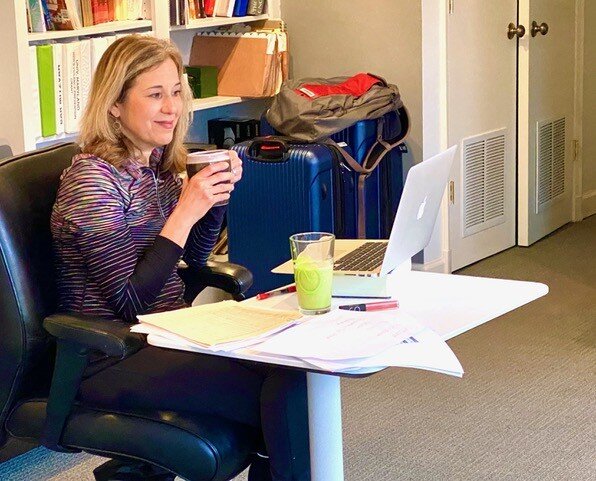Opinion: Why I stuck to the syllabus during a pandemic
We need to strike a balance when public health is in the spotlight
Health Studies professorial lecturer Jody Gan teaches her class online. Photo courtesy of Jody Gan.
By Jody Gan | May 1, 2020
Back when I was still in Watkins 114 with my Introduction to Public Health students, the spread of the coronavirus emerging in Wuhan, China, provided a timely event to monitor. It gave us an opportunity to apply many basic public health principles covered in this broad survey course.
Fast forward three months, and my students and I found ourselves sheltering in our own homes in different time zones, many grappling with challenges like their family’s financial well-being or their own precarious physical and mental health. Despite the disarray, we maintained our biweekly connection to continue our study of public health, a previously amorphous field that had suddenly received greater recognition and new appreciation.
I struggled with how to teach this course — should we drop everything and focus on the pandemic exclusively? We could easily have spent every precious minute dwelling on testing failures and the lack of solid denominators that are critical to public health decision-making, the confusing health messages and guidance provided by the federal government, the different ways governors handle social distancing in their states, the unacceptable shortage of critical supplies like Personal Protective Equipment and ventilators, and the bigger-picture issues surrounding the widening gaps in our public health infrastructure.
But, we resisted and carefully struck a balance. I felt a responsibility to cover the fundamentals of Health 110, both to prepare my students for subsequent classes in their major and for life in the post-COVID-19 world.
As early as this summer, those with a basic understanding of public health concepts may be called upon to fill the army of contact-tracers needed to contain this disease. However, I also felt the need to be sensitive to our collective unsteadiness during this monumental shake-up and wanted the course, and our time together, to provide a much-needed anchor and diversion from only considering topics related to COVID-19.
So instead, we remained true to the syllabus that I quickly moved to an online format, covering topics assigned to the second half of the semester, such as the government’s role in creating health laws and policies, the burden on hospital emergency rooms overwhelmed by treating those without access to primary health care, the history of Medicaid and Medicare, and how healthcare is delivered in other countries.
While soldiering on, we made time to connect frightening reports of the day that built upon earlier concepts covered when we were learning together in a classroom with walls. COVID-19, like other public health challenges, disproportionately affects people of color as do the disastrous disruptions to work and education. Our esteemed Centers for Disease Control and Prevention, whose many functions and contributions I proudly shared with the students earlier, had its expert guidance challenged by the spread of misinformation. The evidence was right before us that public health is woefully underfunded. We also left space for discussing local responses to the pandemic in my students’ hometowns and their firsthand observations and struggles.
For their sake and mine, I tried to keep things positive. I resisted overwhelming them with a blitz of news articles. Instead, we uncovered some silver linings of the pandemic, including college students who replaced vulnerable older adults who have historically been critical community Meals on Wheels volunteers and the emergence of encouraging developments like the much-needed boost to telemedicine.
Last week, I struggled with how to wrap up this extraordinary semester when there were more conversations needed to connect the many remaining dots and bring closure to this three-month period when the field of public health has been in the spotlight like never before.
Additionally, I felt a responsibility to acknowledge my students’ uncertainty about all that remains nebulous in their own world. Is their summer internship or job offer intact? Will their family’s finances permit them to continue studying at a private university? And of course the elephant in the room, will they return to campus this fall or continue learning remotely? I decided to break through the overwhelming awkwardness by telling them what I do know.
I told them that we are living in a moment together that will shape our lives forever, I am proud of them for staying engaged in the course and the good news is that this semester, the final exam is now open book! There will be questions that will allow them to connect course concepts to the COVID-19 pandemic. Because of these unexpected learning opportunities and their innate resilience, I am confident that my students will do well. They must, for the field of public health needs them like never before.
Professor Jody Gan, MPH, CHES, is a professorial lecturer in the Department of Health Studies. They are an outside contributor and do not reflect the opinions of The Eagle.

